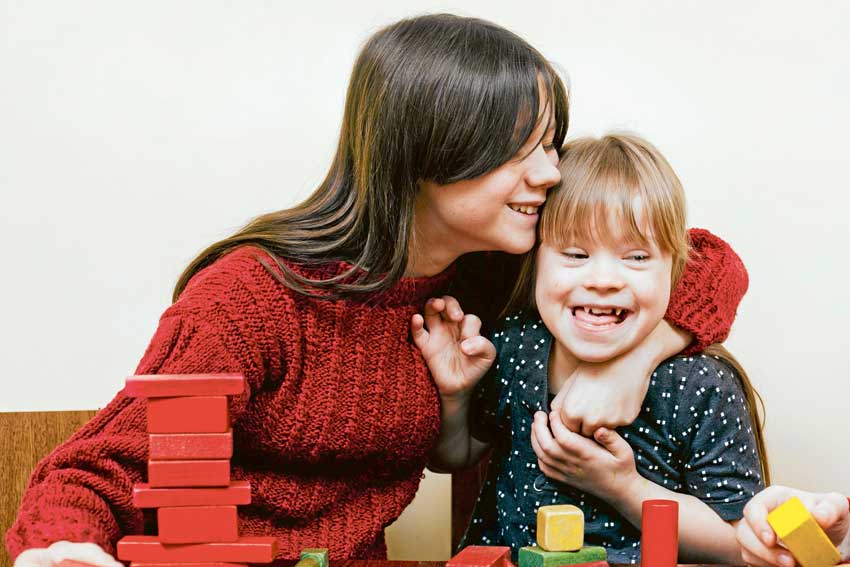
God help those with disabilities in our health care system
Toni Mitchell is a single mother, living in Queensland.
Pregnant with her second child, she went for an ultrasound at her local hospital. The nurse performing the ultrasound suddenly stood up and ran out of the room, returning some time later with a large cohort of doctors and staff.
Toni describes an older doctor coming in and sitting down with his back to her, looking directly at the screen. She described that, with his back still to her, the doctor said: “Your baby has a heart condition. We can see that there’s no walls inside his heart, and so you’re probably going to miscarry within the next couple of weeks.”
The doctor also told Toni it was highly likely her son had Down syndrome. Then he turned around, facing her for the first time. He handed her a piece of paper and said: “So here’s your appointment for a termination”, and walked out. Everybody else walked out too.
Toni told the Disability Royal Commission that this was the moment she started having to fight, the moment she had to start justifying her son’s right to live and to be treated, his value to be alive.
For the rest of her pregnancy, Toni said, she was told that her son would be a burden on her, her family and on society.
The battle continued after her son was born. She had to fight to get him the heart surgery that would keep him alive, fight to get referrals to specialists, and fight to get him the surgery he needed to stop the constipation doctors had refused to treat for 14 years because they had misdiagnosed it as being caused by Down syndrome and not a separate, treatable, condition.
In summary, she told the Commission that she had to fight for the medical profession to see him as a person and not a diagnosis. Two days after Toni’s testimony, Christine Regan took the stand to talk about her daughter Erin, who also has Down syndrome.
Erin was a high achiever, notwithstanding her condition. She won literacy awards and bowling competitions. She trained as a ballet dancer. She worked at McDonald’s. She holidayed with her family and climbed mountains in New Zealand. She was living a full life.
When Erin was 25, she suffered a stroke. But instead of offering Erin the nine-month rehabilitation program usually given to stroke patients, the doctor tried to send Erin home after three days still paralysed down one side of her body, unable to control her bodily functions and unable to recognise her parents.
Christine told the Royal Commission that when she inquired about the rehabilitation program for Erin, the doctor commented: “Oh, look, she has Down syndrome. How hard are you going to try?”
Christine told the Royal Commission that when she inquired about the rehabilitation program for Erin, the doctor commented: “Oh, look, she has Down syndrome. How hard are you going to try?” The decision the doctor made wasn’t a medical one, she said. It was something else; It was a judgment on Erin’s life.
Kim Creevey took the stand after Christine. Her story was in many ways different, but in others, eerily similar. Kim’s son Harri was a quadriplegic who was also unable to speak.
As a teenager, Harri began experiencing breathing difficulties, something which would later be attributed to treatable acid reflux. But Kim had to fight with the doctor for the diagnosis and the treatment her needed.
Kim said that the paediatrician just attributed the breathing difficulties to Harri’s disability. She describes: “And while he was standing over Harri’s bed, who can understand and hear everything that’s going on, he – he said, you know, “How much more money are we going to spend on him keeping him alive? You know, do you have an end-of-life plan for him?””
Every day, the Royal Commission heard stories like this. Every day.
And not only from parents, either.
A palliative care doctor told the Royal Commission that cancer patients with intellectual disabilities were often referred straight to palliative care, even when chemotherapy could have cured their cancer.

While we like to think of our medical profession as champions of life, these stories have demonstrated that this is not always true. There are doctors out there who believe that those with disabilities, physical or intellectual, should not receive the same quality of care as those without such conditions. There are doctors out there who believe that they should not be given any care at all.
Unlike other Royal Commissions, this one has received very little media coverage. I’m not sure why, but it could be because the stories being told expose the culture that emerges from anti-life laws passed in the name of “choice”.
If so much pressure is already brought to bear on parents like Toni and Christine and Kim to forego treatment and “choose” death for their child, how much more pressure will be applied in a society that allows the “choice” of euthanasia?
The only way to preserve real choice is to oppose such laws, and insist that everyone, but particularly our most vulnerable, have the choice of proper medical care and the encouragement to use it.
Related article:
Hearings highlight hostility towards people with disabilities
